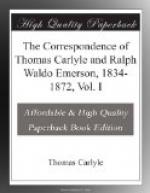it shall lack a present popularity. That it
should not be known seems possible, for if a memoir
of Laplace had been thrown into that muck-heap of Fraser’s
Magazine, who would be the wiser? But this has
too much wit and imagination not to strike a class
who would not care for it as a faithful mirror of
this very Hour. But you know the proverb, “To
be fortunate, be not too wise.” The great
men of the day are on a plane so low as to be thoroughly
intelligible to the vulgar. Nevertheless, as
God maketh the world forevermore, whatever the devils
may seem to do, so the thoughts of the best minds always
become the last opinion of Society. Truth is
ever born in a manger, but is compensated by living
till it has all souls for its kingdom. Far,
far better seems to me the unpopularity of this Philosophical
Poem (shall I call it?) than the adulation that followed
your eminent friend Goethe. With him I am becoming
better acquainted, but mine must be a qualified admiration.
It is a singular piece of good-nature in you to apotheosize
him. I cannot but regard it as his misfortune,
with conspicuous bad influence on his genius, that
velvet life he led. What incongruity for genius,
whose fit ornaments and reliefs are poverty and hatred,
to repose fifty years on chairs of state and what
pity that his Duke did not cut off his head to save
him from the mean end (forgive) of retiring from the
municipal incense “to arrange tastefully his
gifts and medals”! Then the Puritan in
me accepts no apology for bad morals in such as he.
We can tolerate vice in a splendid nature whilst
that nature is battling with the brute majority in
defence of some human principle. The sympathy
his manhood and his misfortunes call out adopts even
his faults; but genius pampered, acknowledged, crowned,
can only retain our sympathy by turning the same force
once expended against outward enemies now against
inward, and carrying forward and planting the standard
of Oromasdes so many leagues farther on into the envious
Dark. Failing this, it loses its nature and becomes
talent, according to the definition,—mere
skill in attaining vulgar ends. A certain wonderful
friend of mine said that “a false priest is
the falsest of false things.” But what
makes the priest? A cassock? O Diogenes!
Or the power (and thence the call) to teach man’s
duties as they flow from the Superhuman? Is
not he who perceives and proclaims the Superhumanities,
he who has once intelligently pronounced the words
“Self-Renouncement,” “Invisible
Leader,” “Heavenly Powers of Sorrow,”
and so on, forever the liege of the same?
------------ * Emerson uniformly spells this name “Teufelsdroch.” ------------
Then to write luxuriously is not the same thing as to live so, but a new and worse offence. It implies an intellectual defect also, the not perceiving that the present corrupt condition of human nature (which condition this harlot muse helps to perpetuate) is a temporary or superficial state. The good word lasts forever: the impure word can only buoy itself in the gross gas that now envelops us, and will sink altogether to ground as that works itself clear in the everlasting effort of God.




